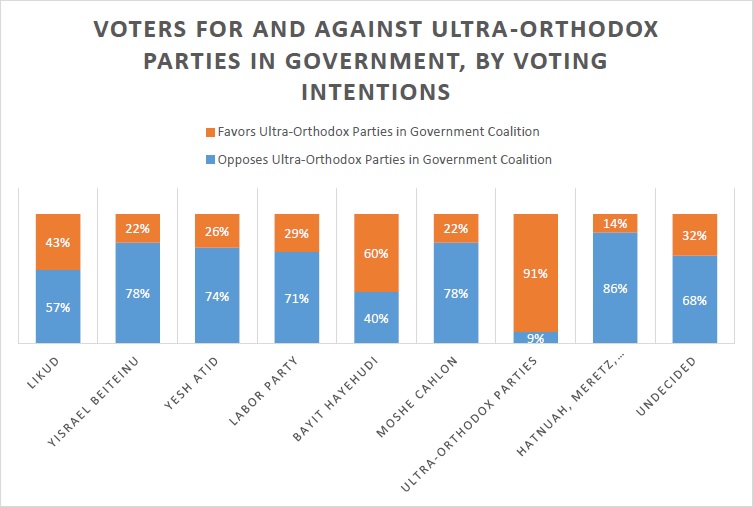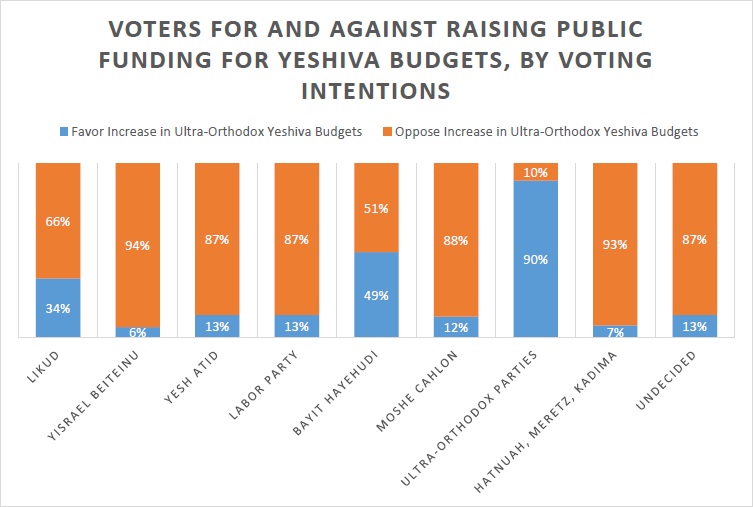Voters Respond: Haredi Parties - in or out?
Overwhelming majority of voters want Ultra-Orthodox Parties out of coalition
According to a December 3 poll, 62% of Israeli voters do not want the ultra-Orthodox parties in the next government, and 74% do not want to increase public funding for yeshivas. But most importantly: how will the undecided voters sway the upcoming March 17 elections?
Uri Regev 09/12/2014 11:21
Tags: elections · knesset · Hiddush Polls
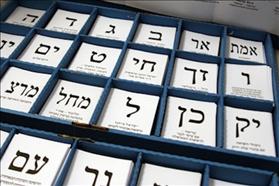
ballots
With new Israeli elections around the corner, Hiddush’s polls have focused on the role that religion/state matters will play on the election in the minds of potential voters. The results of our December 3 poll are unequivocal: The public strongly opposes a return to a government that includes coalition partnership with the ultra-Orthodox parties. The overwhelming majority of the public opposes the excessive preferential public funding for the yeshiva world!
As speculations on PM Netanyahu’s intentions to re-align with the ultra-Orthodox parties are publicized, and similar assessments as to Opposition Leader Herzog’s (Labor) interest in creating an alternative coalition with these very same parties, it is important to shed light on what the public actually wants. The last elections sent a warning against cynical dismissal of public will, as demonstrated in Hiddush’s analysis (link). With this knowledge, Hiddush’s polling and advocacy efforts take on particular importance, given what’s in store (link) if the coalition partnership with the ultra-Orthodox is resumed.
Let’s take a close look at what the public wants: This latest poll conducted by the Smith Institute, commissioned by Hiddush, shows that fully 62% of Israeli voters do not want to see the ultra-Orthodox parties in the next coalition government, and 74% oppose the restoration of excessive public funding to the ultra-Orthodox yeshivas, a sample demand made by Haredi leadership.
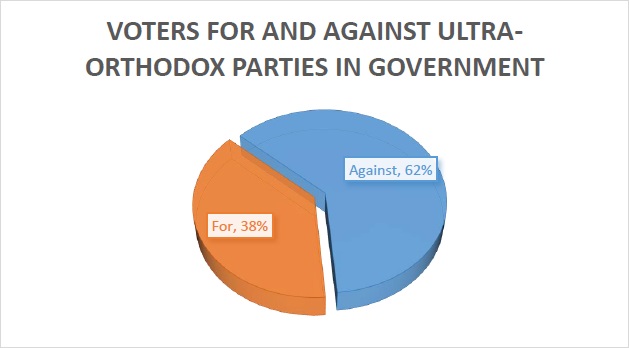
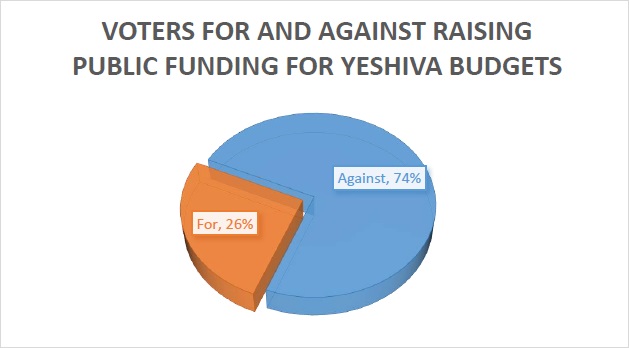
Even among Likud voters, 57% oppose a coalition with Shas and United Torah Judaism (66% of these voters oppose raising the level of public funding for their yeshivas). Likewise, 71% of Labor voters oppose joining with these ultra-Orthodox parties, despite reports that their party is also eyeing a coalition with them to replace Netanyahu. Breaking down the statistics further, the poll reveals that 76% of secular voters, 66% of “traditional” Jews, and 80% of new immigrants oppose a government with the ultra-Orthodox. This large percentage of immigrant opposition may explain Avigdor Lieberman’s reported adamant objection against bringing them into the coalition to replace Yesh Atid and Ha’tnua who were expelled by Netanyahu. 94% of Lieberman’s voters oppose raising the level of public funding to the yeshivas! Unsurprisingly, 95% of ultra-Orthodox voters want the Shas and UTJ parties in the government. (Given that according to recent polls, both Shas and UTJ can expect seven or eight seats.)
Let’s take a close look at what the public wants: This latest poll conducted by the Smith Institute, commissioned by Hiddush, shows that fully 62% of Israeli voters do not want to see the ultra-Orthodox parties in the next coalition government, and 74% oppose the restoration of excessive public funding to the ultra-Orthodox yeshivas, a sample demand made by Haredi leadership.
Old alliances are collapsing, as voter loyalties fade. In the 2013 election, the undecided voter played a pivotal role in the results, opting to vote for parties that hailed the cause of religious freedom and equality in shouldering the civic burden. Not only did nearly one sixth of voters unexpectedly vote for the centrist secular Yesh Atid party, but some 2/3 of them decided on their vote only in the last 3 days leading to the elections. Their votes resulted in the first government coalition without either of the ultra-Orthodox parties in nearly ten years. This “surprise” element may be even greater now, in light of new political players and possible new configurations.
Moshe Kahlon, the Likud’s former Minister of Communications, is now re-entering politics after a two year hiatus. The Israeli public regards Kahlon highly for his role in the “cellular revolution” that drastically reduced the cost of cell phone prices in Israel by enabling phone customers to freely switch companies, eliminating penalties and facilitating much greater competition. Recent polls indicate that his nascent party can expect to win at least ten seats in the Knesset, even before its name, makeup and platform are known! While it is assumed that Kahlon may be a natural supporter for a coalition with the ultra-Orthodox parties, it should be noted that 78% of his potential voters would like to see the ultra-Orthodox out of the government, and 88% oppose acquiescing to their demands to increase public funding for yeshivas.
Former Minister of Justice Tzipi Livni, fired dramatically by Netanyahu, is reported to be negotiating a deal to merge with Isaac Herzog’s Labor party, hoping that such an alliance would offer Israeli voters a viable alternative to the sitting Prime Minister. Since the Knesset passed a first reading of a law to dissolve itself last week, the Labor party has been courting Livni as well as other politicians, including Kadima party head Shaul Mofaz, in an attempt to forge a center-left bloc. While Labor and Ha’tnua running separately were projected to win 15-20 at most, with some polls projecting that Ha’tnua will not even reach the new higher threshold of 3.25%. If they merge, they are projected to win 23-24 seats!
With the statistics showing that the overwhelming majority of the undecided voters oppose surrendering to ultra-Orthodox demands to reinstate the yeshivas’ high level of public funding and oppose the idea of including Haredi parties in a government coalition altogether it may be a good idea for Israel’s political leaders to consider Hiddush's polling results very carefully. In the last round, those who took them into consideration reaped the benefits, and those who didn’t paid the penalties. History may once again repeat itself...
Another potential alliance, though less likely, includes Yair Lapid’s Yesh Atid party, Avigdor Liberman’s Yisrael Beiteinu, and Kahlon’s yet unnamed party. This alliance would represent a center-right bloc, presenting a challenge to Netanyahu’s ability to create a right wing government coalition, particularly because Liberman has expressed opposition to partnering in a coalition with the ultra-Orthodox parties.
Like last year, this election may ultimately come down to the undecided voters in the center who are waiting to hear about Moshe Kahlon’s new center/right party and the potential alliance between the Labor, Ha’tnua and Kadima parties. Yesh Atid is poised to lose seats according to current polls, but after its unexpected success in 2013, party leaders are expressing confidence in the results of the upcoming elections, and it too is reported to be negotiating with Livni. Whether or not the ultra-Orthodox parties are needed to form a government coalition is up in the air. There is no question that the public is eager to see the ultra-Orthodox political extortion of yesteryear done away with. With the statistics showing that the overwhelming majority of the undecided voters oppose surrendering to ultra-Orthodox demands to reinstate the yeshivas’ high level of public funding and oppose the idea of including Haredi parties in a government coalition altogether it may be a good idea for Israel’s political leaders to consider Hiddush's polling results very carefully. In the last round, those who took them into consideration reaped the benefits, and those who didn’t paid the penalties. History may once again repeat itself...
